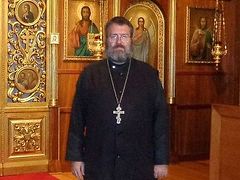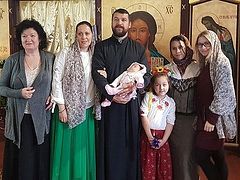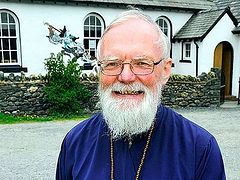Blessed to become a priest by Met. Anthony (Bloom) of Sourozh, Fr. Joseph Skinner has had a lifelong love Russia for Russia. Father Joseph talks about the many problems facing the Orthodox Church in England, while the British do express interest in Orthodoxy. Our conversation with Archpriest Joseph Skinner is about the life of the Diocese of Sourozh, His Eminence Metropolitan Anthony (Bloom), the Black Lives Matter activist movement and the COVID-19 pandemic.
—How did you discover the Orthodox faith and why did you choose it?
—My mother is an Irish Catholic and my father belonged to the Anglican Church. I was baptized in the Catholic Church and sent to study at a respectable Catholic school. But as I turned fifteen, I walked away from my faith. I entered Cambridge University. It struck me that the majority of my circle of friends were believers. That’s how I came to practice Catholicism again.
I felt that Orthodoxy was the true and traditional Christian faith
Then I got married in 1979 and left for Greece (it had to do with my studies). That’s where I encountered Orthodoxy for the first time. The service, formal grandeur, icons, and most notably, the prayer life of the ordinary faithful confounded me. I realized that Orthodoxy was true, traditional Christian faith. It took me a while to internalize this thought. As I returned to England and drew a comparison between the Catholicism that I knew and Orthodoxy, I arrived at the firm conclusion that Orthodoxy was the truth.
I could never fully accept the Catholic dogma about the Pope of Rome’s infallibility. But even that has been among the minor issues. The major point was the experience of prayer in the Orthodox Church. I recently turned sixty-five, so I still remember the times when the Catholic Church held Latin Mass and retained the beauty of its services and church space along with the reverence of the faithful. Sadly, a lot of it was gone following the Second Vatican Council. I finally arrived at these conclusions only after I met Orthodox Christians.
 —Why did you choose the vocation of a priest?
—Why did you choose the vocation of a priest?
—Frankly speaking, I never felt that I made this choice myself. I can rather say that the Lord chose me. It by no means had to do with my ambitions. I was received into Orthodoxy, became a regular at church services, had a few obediences at the altar, and held conversations with clergy; so this question came up rather naturally. However, during our last meeting with His Eminence Metropolitan Anthony (Bloom), I asked him specifically about “to be or not to be.” He did give me his blessing to become a priest.
So here I am, a priest for the last thirteen years of my life, but I served as a deacon before that. I serve at the London Cathedral Church of the Dormition of the Mother of God. I am also the rector of four more parishes outside London, the Diocesan Council Secretary, the head of the Media Relations and Publishing Department and of the Inter-Orthodox Relations Department of the Sourozh Diocese. Apart from worship, I perform the typical priestly obedience of pastoral direction, as we have a rather large group of parishioners, and so I conduct the Bible studies and teach the catechism classes.
—Please, share your impressions about your conversations with His Eminence. What do you remember most about him?
I first met His Eminence Metropolitan Anthony in 1986 when I had just started attending our Cathedral Church in London. He was the one who ordained me a deacon. I had the joy and honor to concelebrate with him during the last eight years of his life. I always remained in the altar with him. What can I say? It is a well-known fact: He was an apostle! A true missionary, I can call His Eminence a new Apostle Paul owing to a story of his meeting with Christ. His Eminence Metropolitan Anthony was a well-educated man. He knew how to connect with people regardless of their social status. In his twilight years, I noticed in him a tremendous feeling of gratitude, both in relation to God and the people. He used to say that gratitude is an essential Christian quality, a great virtue that incrementally leads you to humility. In fact, His Eminence lived this way himself.
It is common knowledge: He is an apostle!
—Who are they, the parishioners of your church? Are they Russians (there is quite a bit of them in London) or there are locals, too?
—Predominantly, they are Russian speakers from different countries of the former USSR. We do have some locals, about five to ten percent of the total number of parishioners. It is a joy to see them actively engaged in the life of the church and taking faith seriously. Apart from Russians, we have quite a few Ukrainians, Belarusians, and other immigrants from the Baltic states. We are seeing Moldovans lately, as well.
—What is the approximate number of parishioners and how active are they in the life of your parish?
—On weekends, there are about 500 people at the cathedral while two to three thousand come for Pascha. We operate a large parish school with about 140 students currently enrolled in the program. Our choir is really good despite the fact that it is made up of amateurs from among the parishioners instead of the hired choir members. Social service in the parish offer assistance to sick children of families arriving from abroad for medical treatment in London. This is just our Cathedral. If you take our distant parishes, they are generally small-sized ranging from 20 to 150 parishioners. But this is where they have a true parish church! Their relationship within the parish is akin to being in a family.
—What difficulties and problems a parish, diocese, and the Orthodox Church have to deal with in England?
—There are lots of them. First of all, there is a shortage of priests, churches, and finances. Most of our clergy have to maintain secular jobs in order to survive and provide for their families. We have what the Lord said: The harvest truly plenteous, but the labourers few (Matthew, 9:37). Secondly, to my regret, there is no English language-based system of theological education for candidates. A Russian native speaker may take up a correspondence course in a Russia-based seminary and get ordained afterward. But we do have some of our British natives among the parishioners who have the desire to become priests. Where should they go?
Another problem is the secularization of all aspects of public life. The people gradually lose the Christian foundations of their culture. Of course, there is an existing problem with anti-Russian bias exacerbated every now and then by the local media that complicates the lives of some of our parishioners, especially those from mixed marriages.
More people are forgetting about their culture’s the Christian foundations. The shift away from Christianity in the West started more than 1000 years ago.
—In this context, how do you develop relationships between the Diocese and the local authorities?
—They turn a blind eye to our existence. It does happen that we are invited to join the representatives of other confessions at events dedicated to the end of World War II. Even if there is any attention, it is purely formal.
—How do the Orthodox get along with the Anglicans and Catholics?
—You know, we enjoyed a rather warm relationship with the Anglicans in the past. For example, there was the Fellowship of St. Alban and St. Sergius aimed at building rapport between the Orthodox and the Anglicans. However, what we observe today is how the Anglicans are departing further away from the Christian tradition. On the other hand, there is a steady flow of locals who convert to Orthodoxy. Therefore, relations with the Anglicans are more complicated these days.
It is quite the opposite with the Catholics, and we enjoy better relationships than before. Most of our parishes don’t own a church building and usually rent out the church premises. As a rule, the Catholic parishes warmly receive our requests of this kind.
—Were there any changes in relations with representatives of the Constantinople Patriarchate after our “Eucharistic communion” was broken?
—On a personal level, nothing has changed. All the previously established connections and friendships among the clergy remained as before. However, to our regret, we cannot concelebrate.
—What Local Churches do the parishes in London represent?
—They belong to the Constantinople, Russian (including those of Moscow Patriarchate and ROCOR), Romanian, Serbian, Antiochian, Bulgarian, and Georgian Churches. In the past, we had the following tradition: on the feast of the Triumph of Orthodoxy, the members of all Local Churches would meet to serve the Vespers together. Every year, we would visit someone else’s church. For example, one year we would celebrate at the Greek church, the Serbian church would be next, then at our church, and so on. Sadly, it is not possible any longer.
—Western civilization is often called “post-Christian.” In your opinion, it is plausible to use this term?
—I think that the process of falling away from true Christianity has lasted for 1000 years. In the beginning, it was vaguely obvious, whereas today we see how fast-paced this process has become. At the same time, British society still holds on to such Christian values as human dignity, mutual respect, justice, and even the famous British politeness.
—How have the limitations due to COVID-19 pandemics affected parish life here? What do you or your parishioners think about this crisis?
The major disruption during quarantine was the termination of regular church services and their substitution with online streaming. Not less alarming was the deterioration of the level of interactions and communication among our parishioners. At the same time, we were unable to perform baptisms, marriage ceremonies, or offer any other services. Needless to say, the financial hardships of parishes have grown deeper as well.
The pandemic and its consequences have taught us to be more responsible in our spiritual life, and made us value what we had in excess before: We could attend church anytime we wanted. I am personally worried about the hysteria whipped up in mass media, and that the outcome of restrictive measures might deliver a harsher blow to our society than the pandemic itself.
—How active is the Orthodox mission in Great Britain?
—Unfortunately, in all fairness, it is not really active. We face the problem called a “migrant mentality”—we are thankful to England for accepting us here and happy to be able to keep our faith as we want, so we will not bother anyone else with our proselytism. However, nothing happens without God’s Providence. One by one throughout the last century, waves of immigrants washed ashore in England with hundreds of thousands of new Orthodox arrivals. The number of Orthodox parishes has grown. Orthodoxy became more accessible to British nationals. Even though we do not carry on missionary activity as such, the locals do come to us with the desire to learn more about Orthodoxy, while some are even willing to join the Church and be baptized. We have trouble managing the ever-growing number of inquirers. I have just received the blessing to conduct online Orthodox catechism classes. The people are thirsting for truth and we are the ones who have the Living Water of our Lord Jesus Christ, so we need to share it with others.
—Why did conservative England pander to the global multiculturalism trend? How could actions of the Black Lives Matter movement amongst the local supporters become possible in a country situated on the opposite side of the Atlantic, far removed from the center of events?
—England has long been rather cosmopolitan ethnically. You may be surprised, but the process of active migration to the country has already been on for the last half a century, at the very least. Among other things, it has to do with the former colonial policies of this country. The notion of place as such is of little significance in the modern world. We’ve got the Internet, and then there are mass media. We have to admit that racism is a worldwide problem and it does happen here, as well. It is evil and sinful. But, on the other hand, this particular movement carries its own agenda that we cannot accept. This is a rather sensitive question.
—Have you ever been to Russia? If so, what has impressed you most in the country?
—During my first trip there in 2000, I was present at the ceremony of glorification of Tsar Nicholas II, the Imperial Family, and the Synaxis of Holy New Martyrs and Confessors of Russia. I have been on a pilgrimage to Diveyevo a few times. What impressed me most… First of all, the acts of faith of the new martyrs. Secondly, the generosity of ordinary Russians. Thirdly, Diveyevo, the place made holy by the ascetic deeds of Father Seraphim, where even air is literally filled with grace.
After I visited your country, I had a feeling as if there was ongoing spiritual warfare aimed at taking over the soul of Russia. The outcome of this battle will have a lasting effect on the whole world.






